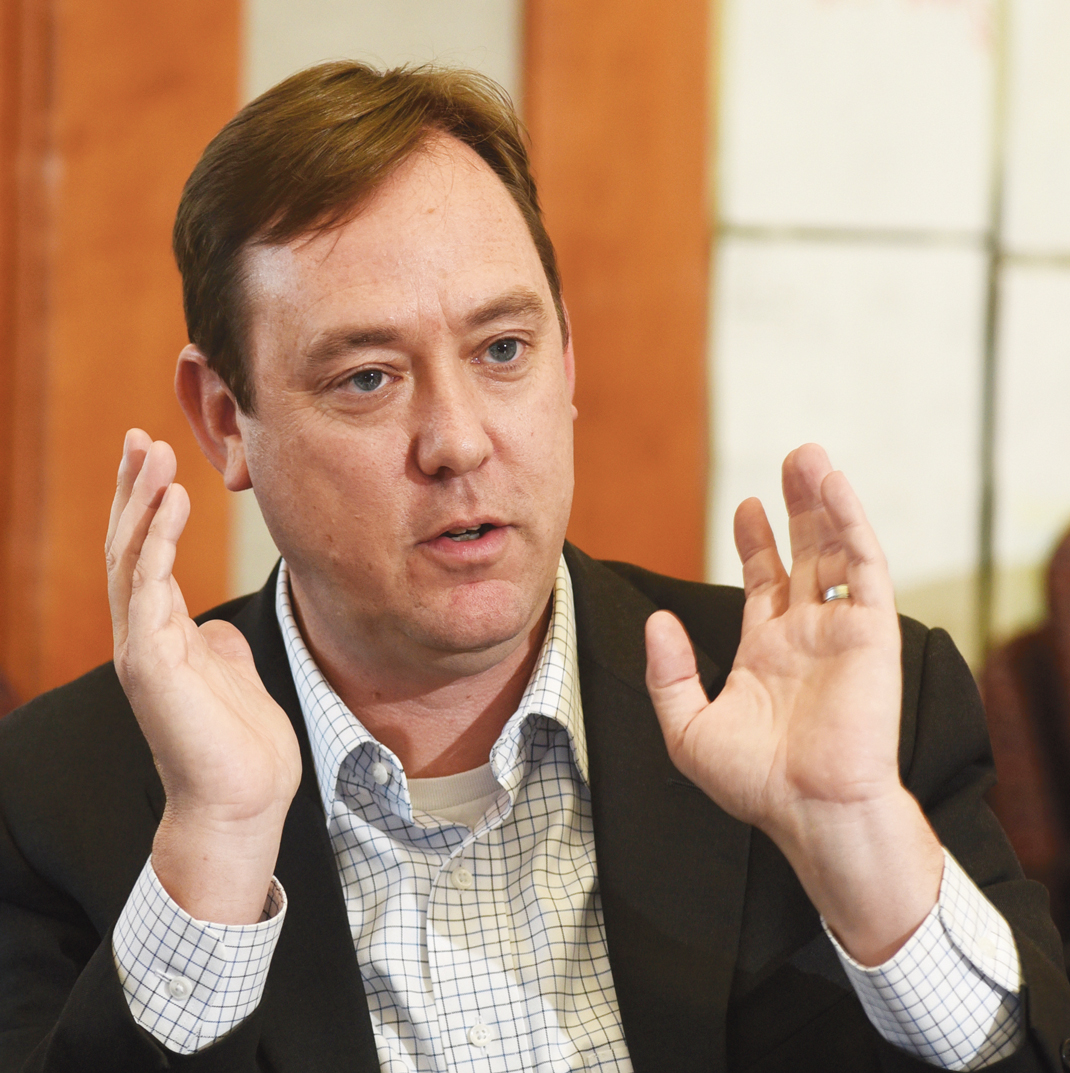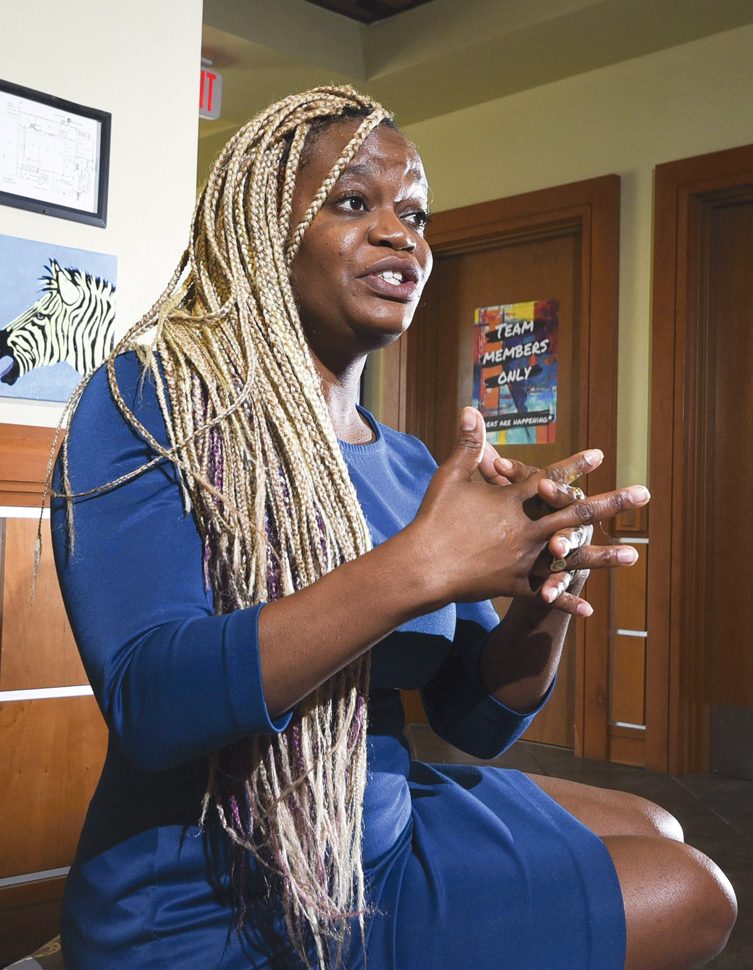As vice president of economic development for the Chattanooga Area Chamber of Commerce, Charles Wood is in charge of directing economic development and helping lead the visioning process Velocity 2040 to plot Chattanooga's economic future over the next two decades. In terms of thinking about the economic future of Chattanooga and Hamilton County on behalf of the city, the county and the business community, Wood rests at the top of the food chain.
Early on the morning of Aug. 22, Wood wasn't out of town recruiting new business or listening to leaders of Chattanooga's largest businesses discuss strategies for the future. Instead, he stood before a group of 24 entrepreneurs or would-be entrepreneurs in the opening session of an "Innovation Ecosystem Tour" at the INCubator on the North Shore, a building also known as the Hamilton County Business Development Center. They were there to learn about the first step, or the next step, in building a business.
The group had been assembled by Darian Scott, director of talent and inclusion at the Chamber; Mary Stargel, whose focus is the Innovation District for The Enterprise Center; and Alexis Willis, director of small business and entrepreneurship for the Chamber. Willis also oversees the INCubator as part of her duties. The participants, all nominated to attend the daylong tour, had come looking for the basics.
Wood didn't offer any. Specifics about taking next steps would come later. Instead, Wood challenged the group to see a bigger picture, the one that ends a long journey with the entrepreneur and community benefiting financially from a great idea that works.
"This is about developing the next generation of wealth," Wood says. "It's not about recruiting a Volkswagen or something like that. It's about growing businesses that prosper, and that wealth gets invested back into the community."
***
Webster's Dictionary defines an ecosystem as a "large community of living organisms in a particular area." As learned in high school or college biology, the ecosystem is one where the different parts are linked together and dependent on one another for long-term survival.
There is an economic development ecosystem in Chattanooga and Hamilton County, and has been since 1988 when the Hamilton County Business Development Center opened on Cherokee Boulevard. The primary "living organisms" in the economic ecosystem are entrepreneurs with an idea that they turn into start-up businesses, which grow into small businesses that are the backbone of job creation.
Promoting innovation
* Chattanooga/Hamilton County INCubator offers low-cost space and assistance for startups on the North Shore.* The Company Lab, also known as Co.Lab., provides counseling, accelerator programs and hosts Gig Tank and Startup Week.* The Enterprise Center promotes research, facilities, collaboration and programs to aid startup success.* Tennessee Small Business Development Center offers counseling and courses for startups and growing small businesses.* LAUNCH Chattanooga offers assistance and accelerator programs for startups.* Brightbridge, Kiva, Tennessee Valley Federal Credit Union Idea Leap program and the Small Business Administration offer low-interest loans and assistance for startups.* Dynamo Fund, The Jump Fund, the Renaissance Fund and other venture funds provide seed and equity capital for startups and growing businesses.* EPB offers up to 10 Gig internet connections citywide, proclaiming Chattanooga “Gig City,” and helps house a local office for Oak Ridge National Laboratory’s commercialization programs.* At UTC, the Center for Innovation and Entrepreneurship helps foster startups and internships for local small businesses while the Center for Urban Informatics and Progress, or CUIP, is helping drive the city’s Smart Community Collaborative.
Joining them in the ecosystem are a growing number of support groups that began forming in the mid-2000s with the idea of developing businesses around arts and culture, transportation, health care and energy, among other economic sectors. In 2010, The Company Lab was formed in 2010, the same year the Electric Power Board introduced the the first citywide gigabit-per-second, high-speed internet service and the moniker "Gig City" in Chattanooga.
"When you look around downtown, there are start-ups in many places," says Kim White, president of the River City Company. "There have been entrepreneurs at the incubator across the river for years, and now there is a growing emphasis downtown in the Innovation District. Everyone is working toward the same goals of creating businesses and jobs."
Over the past decade, "innovation" joined the language of the ecosystem. A designated Innovation District was created 2014 at the recommendation of The Enterprise Center, a non-profit established in 2002 by former Mayor Bob Corker and former Congressman Zach Wamp to study future technologies and economic development opportunities.
The Edney Center for Innovation opened in late 2015 at Market and 11th Streets downtown and houses The Company Lab business accelerator, along with the Enterprise Center, Tech Goes Home and a variety of startup companies housed in co-working space run by the Society of Work. The Chamber of Commerce, which helps operate the INCubator, also sponsors the annual Spirit of Innovation awards to recognize ideas that have turned into successful businesses. The Tennessee Small Business Development Center provides classes and counseling for startups and small businesses at its offices in the INCubator, while the Dynamo Fund, Lamp Post, Renaissance Fund and Jump Fund are local venture capital funds that provide seed money for business startups.
"The ecosystem has quite a few partners who work together to help develop and encourage entrepreneurs in our city," says Willis, who has led the incubator since January 2018. "Over time, more people get involved and more touchpoints are available. Everyone has its place, and we can't exist without each other."
A report on "Entrepreneurial Ecosystems in Appalachia" published by the Appalachian Regional Commission (ARC) in 2018 includes a case study on Chattanooga's ecosystem. The report was based on interviews with more than 20 professionals from startups, entrepreneurial support providers, foundations and local government.
The ARC report talks of "collisions" that occur as entrepreneurs work together in spaces like the INCubator and Edney Innovation Center and tap into the network of resources available through the Chamber. The report emphasizes the critical impact of the city's Gig internet speed while mapping the programs and marketing surrounding the arrival of Gig and the growth of start-ups.
***
"The incubator was the beginning," says Hamilton County Mayor Jim Coppinger of the facility that opened in 1988. "From the beginning, we have always been one of the top three incubators in the country, the top at one time. People from all walks of life with an idea come there. Some have experience in business, and some don't. Some have been successful before but have a new idea."
Nationwide, business incubators help boost the five-year success rate for new businesses from about 50 percent for startups in the general economy to an average 87 percent to those housed in incubators, according to the National Business Incubation Association. The success rate is even higher - about 92 percent - for businesses that are in the Hamilton County Business Development Center.
A profile of the INCubator shows that 584 new businesses have been created and graduated from the facility. Rental rates for manufacturing space begin at $6 a square foot while office space begins at $11. Rent increases annually and clients can stay for three years with the possibility of a fourth. The 54 businesses in the incubator employ 243 people. Eighteen of the start-ups are women- or minority-owned, 33 are service companies and 19 are manufacturing enterprises.
The 125,000-square-foot facility was built in 1930. In 1983, Joe Guthrie of Southeast Tennessee Development District approached the county about repurposing the facility for a business incubator. The county, city and ARC pooled funding to purchase the building and renovations began in 1985.
The incubator opened in 1988 with 10 clients and seven staff members. The Tennessee Small Business Development Center became a tenant and began counseling to entrepreneurs and start-ups. The Chamber assumed operational and programming control of the accelerator in 1998, the county-funded a $4.9 million renovation in 1988 and the Business Development Center was rebranded as the INCubator in 2012.
"When I got here the incubator was more of a real estate transaction than a community of entrepreneurs," says Willis. "Everyone was doing their things, and clients in the building were not benefiting from one another."
Willis is a product of the economic ecosystem, which she said is part of the reason she was hired.
"I became part of the ecosystem when I was an intern at COLAB in 2011 and launched a business there," says Willis, a graduate of GPS and mother of two. "I think they picked me because I was in the ecosystem for so long and because I knew how to build a community."
Willis' efforts to include the number of "touchpoints" and "collisions" for clients at the INCubator began unexpectedly when her second child arrived 12 weeks early last July. After 80 days in the Neonatal Intensive Care Unit at Children's Hospital, it was October and flu season.
"I just brought her to work with me," says Willis. "I just put Riley in a kangaroo pouch and went to work. I walked the halls, hosted meetings and gave tours with her there every step from October to April. The clients went from calling our place the INCubator to the NICUbator."
Willis is the most visible bridge between the 31-year-old business development center and the Innovation District downtown.
"There is a connection that is happening that will make the ecosystem strong in the future," says Willis. "We see our role as creating jobs and providing a safe space to experience the highs and lows of starting a company. And, creating collisions with others experiencing a similar journey. A lot of our clients are in different parts of the cycle of growing a business – we support them where they are in that process."
***
The ARC case study on startup communities examines key components of the ecosystem – talent, market access, community culture, regulatory/government support, business assistance and capital. It's the last one that concerns Ted Alling, one of the founders of Access America who also is one of three principals in the Lamp Post Group, a business incubator founded in 2010.
Alling said the past nine years of entrepreneurship in the region were the result of a lot of people "thinking the same thing about start-ups" and investors who "bet on our community." Still, Alling said, a lack of capital to invest in start-ups and sustain them limits the growth of start-ups.
"A lot of people have done a lot of great things," says Alling, "but I will never be pleased. I think we need to do a lot more. The gig was awesome and really marketed great, but everyone has the gig now. But we took that and make Chattanooga cool place to come and start a company.
"There are cycles with start-ups. Our next cycle needs more capital. We need more entrepreneurs and more capital. We really have a chance to be a Boulder or Austin."
The economic ecosystem needs an infusion of cash.
That's what Alling, Allan Davis and Barry Large provided through the Lamp Post Group after the trio started and created Access America. The company founded in 2002 grew to more than $600 million in annual sales and 500 employees before being sold to Coyote Transport in 2014.
"Companies started here are about to begin reinvesting in Chattanooga, doubling down, just like we did," says Alling.
Just like the vision Charles Wood cast in September for a group just entering the "innovation ecosystem."


